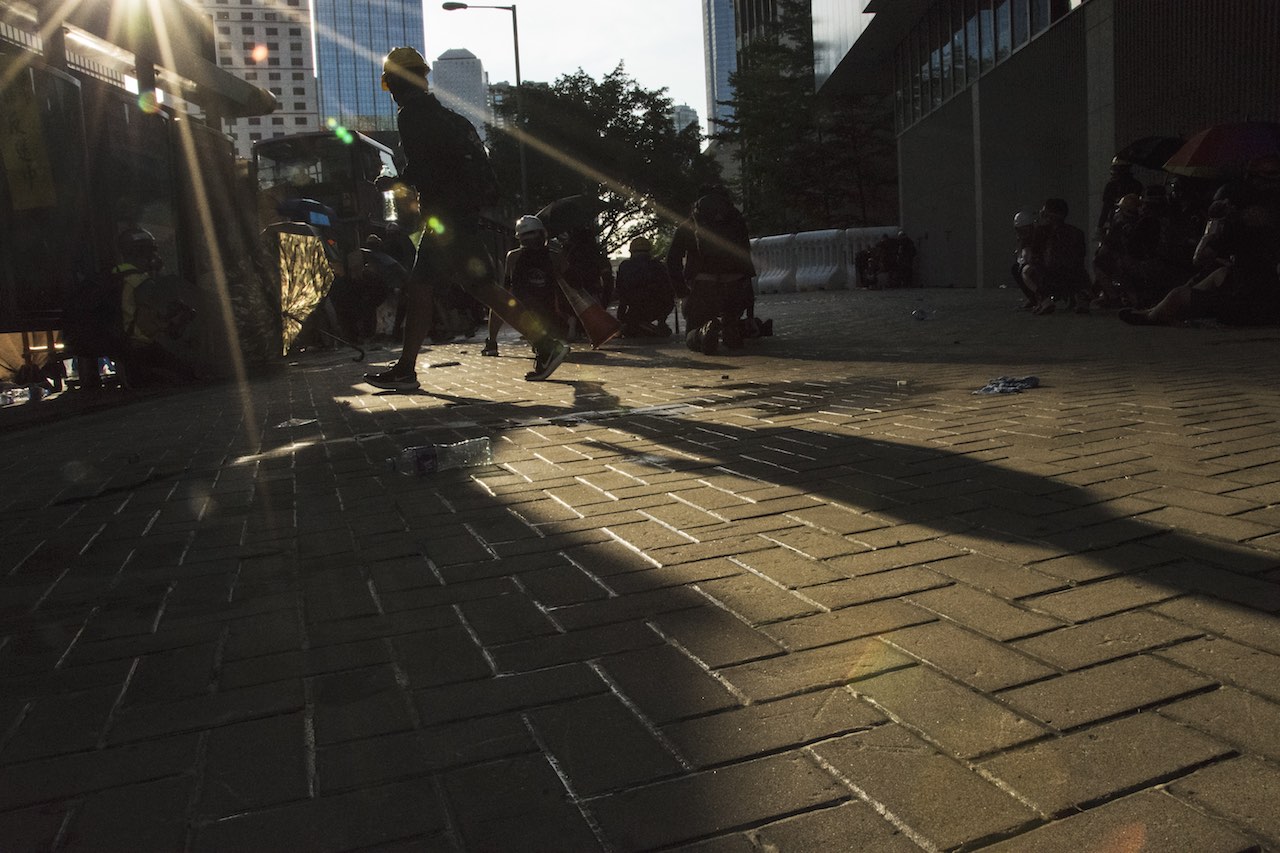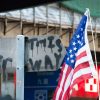Original: 【「低語與行動:反送中/大運動中的左翼聲影」專題序言】, published in Reignite Press 懷火
Translators: P, Joy Ming King, R, Brian Ng
If you would like to be involved in our translation work, please get in touch here.
Translators’ note: The following article is the foreword to a series of interviews of leftists engaged in Hong Kong’s 2019 anti-extradition movement. Lausan is currently translating the interviews, which will be published in the coming weeks and linked below.
Foreword
“Social movements are about holding your breath. One breath might not last you through the whole process—it usually doesn’t. That’s why, just like in swimming, holding your breath in a social movement is a limited strategy. In order to sustain your movement, you must learn to come up for air. Courage in social movements comes from mutual encouragement. It’s something that vanishes and grows back again. The key is not in the heroic posture of a swimmer dashing through the finish line, but rather in each instance of coming up for breath and in finding ways to breathe, so that you can dive deeper and make new waves.”
—《魯蛇之春》 (Losers’ Spring)
Waking From A Dream At Midnight
After the march on June 9, I kept pondering over whether I should join the action to storm the Legislative Council. As I hesitated, a unit of the police’s Special Tactical Squad entered the area outside the Legislative Council building. Staying any longer would entail the risk of arrest. A leftist friend of mine who was in the frontline “charging team” with me urged me to leave, saying, “Is this issue worth it?”
Perhaps these sentiments are shared by other leftists in the movement. We don’t want to alienate ourselves from the masses, but we also feel very distant from them. Should we get involved? Is it worth it? How should we get involved? Suddenly, these became important questions to answer.
Indeed, many of our leftist friends have, after a period of inner struggle, used different methods to stand up against the Extradition Law Amendment Bill. Most of these people have varying disagreements with and may have tried to retain a level of distance from mainstream arguments, organizing strategies, mobilization methods, and the general shape of the movement. For example, they may say that this movement is too liberal; it is overly fixated on the identity of “Hongkonger”; it is too disorganized; it is too populist; it is overly romantic; it is too preoccupied with the fantasy of “rule of law”; it is too right-wing; it is too scared of the Chinese Communist Party… There are many such objections.
For this reason, these ruminations, never laid out in the open, haunt people at night. These people wonder: “Am I bolstering a movement that I don’t agree with? Is it wrong to look for allies in the fight against a bigger, common enemy? In the fight against this common enemy, can the divisions that exist be suppressed for much longer? Ah wait, Telegram is buzzing—the government must have done something again. It’s better not to think too much.”
Keep your entanglements to yourself; the movement will not wait for you. One million, two million people have come out onto the street—what are you waiting for? You wake up—all you can do is to pretend that last night’s midnight murmurs were only just a dream; you wake up, and everyone is sharing and liking Thomas Cham’s excellent article. [NB: Lausan has translated Cham’s piece here.] And afterwards, we trudge along with our hesitations, our attempts at disentanglement, our murmurs.
Interview objective and plan
First, although we have not seen a very clear leftist discourse around the movement, we nonetheless believe that there is a dialectical relationship between ideas, arguments, emotions, and action. As such, recording and understanding our leftist friends’ thoughts and reflections before and after taking actions may do a better job at capturing their general attitudes towards the anti-extradition movement than their incisive statements, arguments, and position papers.
At the same time, proceeding with this attitude has not come without its own conflicts, tensions, or doubts. But we believe that sharing these difficult questions out in the open is the first step to coming to a collective resolution of these problems. Recording the thoughts of the left in this particular situation is also a way of providing those who encounter similar problems in the future with a point of reference. In fact, after the 2014 Umbrella Movement, the fateful question of how the left could move forward in the bigger movement was not systematically dealt with; it created many wounds in the movement, and those impulses, tensions, hesitations, and doubts that were repressed have been gnawing at all of us. In 2019, how is the left to continue to deal with these crucial questions in our actions and our thinking? How are we to deal with these questions in the future? This piece is also meant to provide reflections and resources for working through contradictions in the future.
Am I bolstering a movement that I don’t agree with? Is it wrong to look for allies in the fight against a bigger, common enemy? In the fight against this common enemy, can the divisions that exist be suppressed for much longer?
This discussion includes a number of people who begin their analysis by looking at the US-China trade war, engaging in a top-down analysis of the movement. But we believe that apart from these broader analyses, it is important to understand the strength of mobilization from below, in order to understand the thought processes, revelations, and tentative steps towards rupture of those who have participated in the movement. We are hoping, in the following series of articles, to enable these Mainland Chinese, Hong Kong, and Taiwanese leftists to speak from their lived experience, in order to understand their praxis. Each person’s testimony may not be completely uniform, cogent, or complete, but they are complex and sincere. It is our hope that you—no matter if you are “international” friends (international-online.org) or leftists from the movement—will listen carefully and thoughtfully to these murmurs.
The following recordings, ruminations, and responses arose from the discussions of a group of leftist friends in Hong Kong. These friends are all frontline social movement activists, coming from NGOs, labour groups, labour unions, grassroots community organizations, etc.; included are also some unaffiliated organizers and leftist academics. We hope that these discussions will allow our leftist friends—who twist and turn in their beds out of agitation and hesitation—know that they have comrades who are thinking through the same doubts and engaging in the same reflections. More importantly, we hope that they will show that leftists participating in the movement have managed to provoke ruptures and work through particular contradictions.
The interview transcripts and analyses will be uploaded in due time. Based on our particular knowledge and feelings about the left, large scale social movements, and organizing, our discussions have revolved around the following questions:
- What is your own understanding of the Extradition Law Amendment Bill? Were you able to communicate these understandings at the beginning of the movement against the bill?
- What kinds of material interventions have you made in this movement? What was the thought process behind these interventions?
- In your view, starting from the proposal of the Extradition Law Amendment Bill to today, what have been the main arguments raised by left circles/organizations/individuals? What kinds of actions have been, in your view, more organized? If none have been, why?
- The democratic and localist camps have been the mainstream initiators of this movement. If say, you had particular critiques of their analyses, would that affect your level of participation or how you intervene in this movement?
- How do you understand the emotional charge behind this mass movement?
- What have been your observations regarding these large-scale, crowd-initiated actions? What observations and analyses do you have regarding organizing strategies on the ground?
- We all see ourselves at a distance from the mainstream. Under the circumstances of this mass movement, how have you tried to rethink your relationship with the broader public, and the types and extent of action that you will take?
- What do you think the left can do in this movement? What will they be unable to do?
- Can you identify continuities between the situation of the left in the 2014 Umbrella Movement and in the present day?
In case you don’t know what is happening
Following the 2014 Occupy Central/Umbrella Movement, another mass movement has broken out in Hong Kong in 2019. The protests started when the Hong Kong SAR Government wanted to submit a draft law to the Legislative Council through the murder of Poon Hiu-wing, in order to launch a channel for the transfer of suspects between China, Hong Kong and Taiwan. The Ordinance would allow suspects sentenced to more than seven years in prison across the border to be handed over in accordance with the principle of “same crimes in both places.” The Hong Kong Government would also be obligated to assist Mainland Chinese judiciaries to freeze and confiscate property in Hong Kong. On June 9th, the FDC launched the third anti-extradition protest. The crowd marched from Victoria Park to the government headquarters from the afternoon until the end of the day. At 10 o’clock that night, the conference announced that the number of participants reached 1.03 million, far exceeding the July 1 Parade in 2003.
After the protests, in response to the government’s failure to respond to protesters and withdraw the extradition amendment bill or apologize for police brutality, many protests, rallies, street stations, non-cooperative actions of all scales began to blossom everywhere. Rallies outside the Legislative Council continue to occur. On June 15, Chief Executive Carrie Lam announced at 3pm that, having ignited widespread societal opposition, the legislative procedure to pass the extradition law amendment bill would be suspended. Around 4pm, a 30-something year old man wearing a yellow raincoat sat precariously on the platform of Admiralty’s Pacific Place, carrying a sign saying: “Formally withdraw the extradition law; we are not rioters; release the students and the injured; Carrie Lam, step down; Help Hong Kong.” At 9pm, the man fell from the building, and could not be resuscitated.
This incident struck a nerve with citizens, resulting in the Civil Human Rights Front-organized march on June 16 which started off from Victoria Park at 2:30pm, and was still ongoing after 8 hours. That night, CHRF announced that the protest had been attended by 2,000,000+1 people, a greater number than the number of Chinese people participated in the 1989 pro-democracy protest, and a record number of people of Hong Kong protesters. CHRF further indicated that it would initiate a “Work strike; market strike; school strike” event on August 17, with the same demand: “Carrie Lam, resign; withdraw the extradition bill.” This activity is still ongoing.
It is important to understand the strength of mobilization from below, in order to understand the thought processes, revelations, and tentative steps towards rupture of those who have participated in the movement.
On July 1, the march began with some protesters beginning to interrupt the flag-raising ceremony, and in the afternoon, there were many confrontations at the Legislative Council. Finally, at night, protesters successfully broke through the glass and occupied Legco for three hours. In the early hours of July 2, the police fired tear gas to disperse those protesters who had surrounded the Legislative Council in support of the protesters, and the protesters inside Legco also withdrew. A new round of arrests are currently taking place. On July 7, people on the internet initiated a large protest on July 7 in Kowloon, which the organizers announced had been attended by 213,000 people.
On July 9, Chief Executive Carrie Lam indicated that the extradition law amendment bill had been “suspended”; however, because she did not use the word “withdraw,” this provoked widespread anger. The movement began to enter into the neighbourhoods: Tuen Mun, Sheung Shui, Sha Tin, Yuen Long—there began to be rallies and confrontations with police. On July 21, in Yuen Long, there appeared triad gangsters who started beating people. Legislative Council members shaking hands with triads were scrutinized; so was the police’s inability to intervene in the beatings. This led to a new stage of anger on the part of citizens, who argued that the police and triad gangsters were of the same kin. Afterwards, there emerged more and more confrontations between police in Yuen Long and in Central and Western districts. So far, in regards to the strike, netizens have called on three major strikes to occur on August 5 (work strike, school strike, market strike).
It is also important to note that this movement has transcended the previous style of “leader-initiated protest” (protests that are initiated by CHRF or other “officials,” who control the movement’s rhythm, organizing style, and information). LIHKG and Telegram have become the fulcrums of strategic discussions and communications; those who do not have organizing backgrounds constitute a large proportion of participants in the movement, as well as younger people. Compared to Umbrella, relations between people are kinder, and the impulse towards direct action is stronger. Citizens have widely agreed upon five main demands: “Do not prosecute protesters”; “Remove the characterization of protests as ‘riots’”; “Investigate those responsible for triggering the crisis”; “Withdraw the extradition bill”; “Carrie Lam, resign.”
Interviewees’ profiles
Translators’ note: Lausan is currently translating the interviews, which will be published in the coming weeks and linked here.
Ah Ng, a member of the Grassroots Development Centre (GDC), was a participant in the 1990 Tsuen Wan balcony incident, and the movement to oppose the registration of social workers; he has also participated in campaigns to reduce the cost of rent of public housing, to reject the privatization of public resources, and to advocate a universal pension scheme, and thus carries many years of experience in local organizing and social debate. He has insisted on the need to stick to the grassroots level, and has worked hard to organize residents, workers, the elderly, and other such marginalized groups in order to fight for their rights.
Ruben, a member of the Student Labour Action Coalition, was previously a chairperson of a university student union, and has participated in social movements for around five years.
Yashae (nickname), an anarchist, was previously a member of Autonomous 8a, and began to participate in social movements from the anti-WTO campaign in 2005. In recent years, he continues to participate in film screenings organized by the League of Social Democrats, and now is a member of a non-union organized, workers’ NGO. He cares about gender issues, migrant movements, workers movements, and is looking for ‘non-organized’ organizing strategies.
S (nickname), is an unaffiliated activist in the left. He began participating in social movements after using LIHKG discussion forums, including participating in a netizen-led June 4 hunger strike in 2009. Since then, he has participated in social movements as an individual, without joining any group or organization; he also has not worked in social movement circles, and is a worker. He has previously engaged in blue-collar labour organizing, and has recently become a manager in a small company. He is sometimes seen on the front lines of protests.
Lee Chun Wing is a lecturer at Polytechnic University, a previous organizer in Left21, and is now a core member of The Owl. He loves football, and is actively thinking about applying the time he puts in social movements to achieving the goal of watching 200 soccer games in one year.
Wong Choi Fung is a housewife from Kwun Tong, with two disabled people in her household and an adorable seven-year-old son. In May, she initiated the “Citywide Kowloon, New Territories, and Outlying Islands Housewives Anti-Extradition” petition, which has accumulated approximately 6,000 signatures, attracting attention from the widespread public and even legislators. She manages with a group of other housewives a Facebook page by the same name, and has continued to use the title “Housewives have something to say” to hold street stations, soup giveaway stations, and online message platforms, to participate in the anti-extradition movement.
D (nickname), began by observing social movements, including the Star Ferry protests, until 2011, when they began to organize in the Occupy Central communal space. Luckily, they ran into allies (who are increasing in number), with some of whom they have started running a vegetarian co-op for around five years. They have also joined friends who are interested in publishing to create the collective “Printhow,” with the aim of using grassroots communication methods to connect different worlds. They like cartoons, writing, filming, and joking around.






